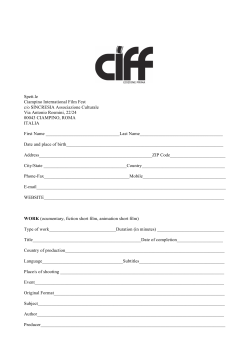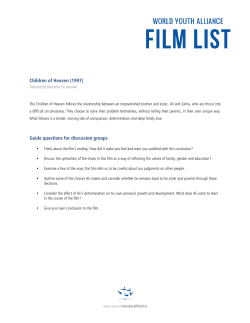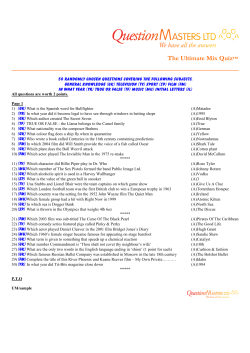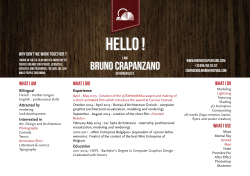
Creative Skillset Film Skills Fund
Creative Skillset Film Skills Fund Funding Programme for Cross-media Total fund: £70,000 Deadline: Noon, Thursday 11 June 2015 About the Creative Skillset Film Skills Fund Creative Skillset’s Film Skills Fund is funded by the British Film Institute (BFI) with National Lottery funds and through the Skills Investment Funds, which comprise industry and Government coinvestment. The Film Skills Fund is part of the Film Skills Strategy, which addresses the vital skills and training needs of the film industry to deliver maximum economic and cultural return: to create jobs, strengthen skills, build skills for the future, and ensure world-class film education. Find out more about the Film Skills Strategy. Please read this Funding Programme in conjunction with the Creative Skillset Funding for Organisations Guidelines. Please then call and discuss your project with Film Partnership Manager Rebecca Davies before submitting your application – rebeccad@creativeskillset.org / 020 7713 9869. Funding aims This funding programme supports the BFI Film Forever strategic priorities ‘Supporting the future success of British film’ and ‘Boosting audience choice across the UK’. The programme supports producers, writers and directors, and independent companies in developing cross-media approaches to build and reach an audience for their work in a world of rapidly evolving patterns of consumption. Creative Skillset has supported cross-media training for many years, and recognises that talent from film and other creative sectors are fast becoming multi-platform storytellers and content creators, creating new interactive worlds for audiences to experience on an entirely new level of engagement. New cross-sector partnerships and creative roles have emerged. The need for creative individuals and top talent who can work across different sectors and platforms will continue to increase as technology opens doors to faster and innovative means to consume content. 1 We invite applications to deliver cross-media training initiatives that respond to some or all of the following needs: Writers / Directors Story development – writing for different platforms and key considerations Knowledge of cross-sector story opportunities and emerging markets Design thinking – mapping the audience journey and decision-making process Producers Commercial awareness Monetisation of cross-platform content and identifying business and funding opportunities Design thinking – mapping the audience journey and decision-making process Developing creative entrepreneurs Understanding digital delivery processes Identifying and nurturing partnership opportunities, e.g. marrying talent with digital companies and professionals Knowledge of cross-sector processes and emerging markets What should training look like? We will consider a variety of delivery methods but are likely to prioritise: Mentoring programmes which provide intensive and longer-term professional support; Training with a project-driven focus, testing and innovating new practice and prototypes; Training which brings together professionals from different sectors and backgrounds, including digital agencies, funding bodies, film commissioners, and online distributors. The Creative Skillset Film Skills Strategy complements the BFI’s talent development strategy, and we particularly welcome applications that will actively support and enhance other BFI strategies. We welcome applications that will benefit film talent, experienced professionals from other creative sectors who are looking to develop film content and improve their film knowledge and networks, as well as projects and talent supported by the BFI and the BFI NET.WORK. We are likely to support 2-3 training programmes from a £70,000 fund. 2 Application criteria Applications must be made by organisations (not individuals) that have experience of delivering successful industry-led training or can demonstrate how they will secure this expertise; Training must address our funding aims as identified above; Training must be delivered by 31 December 2016; Training should not duplicate what is already available in the UK and must offer value for money; Trainers and speakers must have a good track record in providing industry training; Training must be available UK wide (this can be facilitated by regionally based training and/or travel and accommodation bursaries via the project budget); We will prioritise applications from companies who have not previously been supported through this fund. Who cannot apply to this fund? Individuals cannot apply under this fund. Find out more about support for your own training needs. Projects where outcomes are solely geared to the practices and business interests of a single organisation will not be funded. Your application Applications will be assessed against the funding aims and application criteria set out in this document and the Creative Skillset Funding for Organisations Guidelines. Your application should detail how you will include the following key elements in your delivery: Industry-led training The training programmes we fund must be led by industry, be innovative and provide value for money. We expect applications to demonstrate input from established industry professionals into the training programme development. Diversity Creative Skillset is committed to improving the diversity of the film industry’s workforce to better reflect the UK’s diverse population. We have set participant targets which are specific to this funding programme. Please see below. The Creative Skillset Film Production Workforce Survey 2010 provided the following workforce statistics in gender, diversity and disability for the film production and creative development workforce: 3 Gender – In 2012, female writers were credited on 13% (down from 19%) of UK films and female directors were credited on 8% of UK films. (BFI Statistical Yearbook 2013). Women also face a 15% gender pay gap compared to 10% nationally. Black, Asian and Minority Ethnic representation is 8%, compared to 5.4% in the wider Creative Industries; 0% of creative development respondents stated they had some kind of disability, compared to 9% in the wider Creative Industries. In order to make an impact on these figures we have set the following participant targets which are specific to this fund: Female participants – We are setting our target to 60% in order to contribute towards redressing the balance of female writers and directors. We will also prioritise positive action schemes recruiting all female cohorts. Black, Asian and Minority Ethnic participants – 20% Disabled participants – 10% Applications must demonstrate a commitment to reaching these targets. This should include proactive policies, e.g. providing access provisions for disabled applicants, childcare subsidies, travel subsidies etc. Applicants will need to collect diversity data for all participants, including those who apply to take part but are not successful. Evaluation It is essential that Creative Skillset is able to demonstrate the impact of its investment to promote the depth, breadth and impact of training to the wider industry and to reinforce the benefit of continuing to invest in the skills of the UK Creative Industries. Evaluation of your training programme should be embedded throughout its delivery so that the training can be improved upon throughout its lifetime. You must also plan for a dedicated evaluation phase upon programme completion. You must detail how you intend to evaluate your training clearly within your application, including the measures of success you will look for. Impact and legacy We expect supported training programmes to plan their legacy in order to extend accessibility and impact. This could involve filming content to disseminate online, producing a report from the training highlighting the learning outcomes, or encouraging participants to blog about their experiences so that others can share their learning. You must detail your impact and legacy proposals clearly within your application. Sustainability Creative Skillset is committed to supporting the environmental and economic sustainability of UK film and works with its funded partners to raise awareness and standards across the sector. All applicants for funding must evidence their own sustainability policy and demonstrate how they have considered environmental and economic sustainability in the development of the proposed training activity. 4 How to apply All applications must be discussed with Film Partnership Manager Rebecca Davies before being submitted. Please contact Rebecca on rebeccad@creativeskillset.org / 020 7713 9869. Please note there is a high demand for our grants and funding is limited. Your application will be assessed against the criteria set out in this Funding Programme. Creative Skillset reserves the right to apply a portfolio approach to ensure the fair distribution of funds across industry, subject to meeting the required quality threshold. How much should you ask for? We are likely to support 2-3 training programmes from a £70,000 fund. The amount you request should be the amount you need to deliver your project efficiently and effectively. We pay close attention to value for money over all our programmes. Please note: if you are registered for VAT, your figures should not include VAT that you can claim back. If you are not registered for VAT, your costs should include VAT. Grants we make are ‘outside the scope’ of VAT (this means that they are not a business activity). They must be listed in your accounts as a grant and not, for example, as a fee. You should seek financial advice from your own accountant or the relevant tax office. Partnership funding We will not normally meet more than 70% of a project’s delivery, and may invest less. We therefore expect you to find a minimum of 30% of the money you need from sources other than Creative Skillset, such as partnership funding. A minimum of 25% of your partnership funding must be cash. For example, if your project costs £100,000 and you’re applying for a total of £70,000, the remaining £30,000 is your partnership funding. Of that £30,000, at least £7,500 must be cash. As this is training for existing professionals we expect participants to contribute towards their training and some if not all your cash partnership funding will come from fees. Risk assessment Successful applications will be asked to identify their project’s financial and non-financial risks. Please bear this in mind when making your application. Whilst not all risks can be mitigated, we will ask you to provide details of how you will address any threats to the success of your project. 5 Using the online application form Please apply using the online application form accessed by this link. Once you have completed the online form you will be asked to attach the following completed documents: Project and Budget Report template The following should be attached as Microsoft Word documents: Detailed course outline and schedule; Trainer/tutor CVs; Company financial information. If you have submitted an application to Creative Skillset in the last 12 months or would like clarification, please contact a member of the Fund Team at the details below as we may not require further financial information. When you have successfully submitted your application you will receive an automated email confirmation. Please note that we cannot accept responsibility for any late or incomplete applications and regret that these will be rejected. Contact us For more information on the application process or any queries, please contact: Holly Mackavoy Fund Co-ordinator e: hollym@creativeskillset.org t: 020 7713 9877 Key dates Deadline for applications: Noon, Thursday 11 June 2015 Awards announcements: Week commencing Monday 27 July 2015 6
© Copyright 2025









